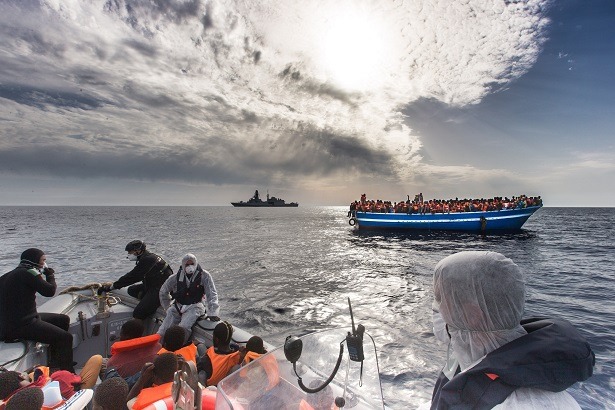There are many subjects that are difficult to write about, but for me one of the most difficult ones is immigration. This might sound surprising, because it seems that nowadays everybody writes about it and everybody has outspoken views and opinions on it. You can’t open a newspaper or a news website without being flooded by articles and op-eds on the topic. And it is difficult to hear objective truth in this cacophony of often very conflicting messages.
In August, a photograph – taken at Kos – went viral. It depicted a Syrian family that barely survived the journey accros the sea. They were escaping a country torn apart by war and conflict, and had almost drowned. Fading fear and relief dripped from their faces. That same week, a well-respected Dutch journalist published an article about the situation of migrants on Kos. According to this article, no one there was on the run for war or oppression; the migrants were depicted as opportunistic, well-off people, for whom the journey across the sea was “such fun”.
Journalistic responsibilities
Needless to say that the latter article wasn’t particularly conducive to creating sympathy for the situation of migrants and refugees. Journalists should be aware that they bear a great responsibility. Anti-immigration sentiments are steadily growing – and even give way to increasing violence against immigrants and refugees. What journalists write can easily fuel sentiments that are beneficial to none and harmful to all.
Anti-immigration sentiments are not only growing, they are becoming increasingly normal. Such was also observed by Anja Reschke. The ARD news anchor used her own TV evening slot to openly express her dissatisfaction with growing anti-immigration sentiments. Reschke expressed a particular concern for the apparent “normalization” of racist rhetoric against immigrants and refugees. Within a few days, millions on the Internet had viewed her statement. One can debate on whether a news anchor should be so outspoken about his or her personal opinions. But that such a process of normalization is at hand seems undeniable. And that it should worry us, too.
Barbwire and landmines
To prove how toxic the debate has become you just have to open Facebook or Twitter. People are indeed no longer ashamed to say the most horrendous things. We have all seen the images of refugees breaking through the Greek-Macedonian border: people being pushed, children and women stumbling, dehydrated children crying for water. Heart wrenching. But the comments on these images too, tend to be heart breaking. “We must use bullets.” “Why are there no minefields to stop these people?” “Look, the new terrorists are coming.”
I can’t understand how images of suffering children can provoke such comments. A person who believes barbwire and landmines are the proper response to a suffering child, should not say a thing until he removes the barbwire and landmines that surround and trap his own heart and mind. There is nothing as intolerable as a child suffering. Dostoyevsky once observed that to see a single tear well up in the eye of a child is a sufficient reason to stop believing in God. But to see a child cry and then to read such hateful reactions on the Internet, that surely must be a sufficient reason to start believing that the devil really exists, and that he resides in the hearts of many of us.
Seeking a solution
It is not easy to pursue rational debate and to develop a constructive approach when the toxic smoke clouds of impulsive reactions darken the sky and make it difficult for our thoughts to breathe. Yet we must seek solutions, for Europe cannot tolerate any humanitarian crisis at its borders.
Some argue that a new state should be created, and that all refugees should be sent there, and start a new life there. I don’t think that is desirable, nor doable. You don’t solve a problem by relocating it. Some argue that economic migration is a substantial part of the solution: we should welcome newcomers if they are educated or somehow beneficial to our own economy.
I am highly sceptical to such a kind of reasoning. First, I think such a view is thoroughly anti-Kantian. Never treat a human being merely as a means, but always as an end, Kant maintained. If you are only open to newcomers if they are useful to you, you instrumentalize the other, and according to Kant, not much good can come from that. Second, those who are of use to us are rarely the ones who are most in need of our help. Thirdly, we should keep in mind that there are three players in every migration story: the migrant, the host country, and the country of origin. Economic migration can be beneficial to the individual migrant and the new country, but we must not neglect the fate of the country of origin and those who stay behind. Moreover, the key to solving the present and future crises lies in the latter. As long as it is terrible to live in one place, and fairly good to live in another – the latter place will attract many possible newcomers.
Compassion and self-interest
Such is also the view of Paul Collier, internationally renowned expert in governance in low-income countries, globalization and poverty. The West needs to adopt an attitude of compassion and “enlightened self-interest” towards the countries from which people escape. Otherwise there will be a ceaseless incentive for people to migrate. And as long as there is such an incentive, problems will accumulate.
I disagree on several issues with Collier. He maintains for example that refugees on the run for war and oppression should return to their land of origin once war and oppression have come to an end. That seems immoral – especially when you take into account that wars and conflicts can last for many years. To send someone back, after ten years, to a country from which he has alienated, does not seem like the right thing to do. Moreover, I don’t think this would be conducive to the integration of migrants either. If you know you will have to return anyway, and if you know you will never really belong to the community in which you have arrived, why should you then exert yourself, make friends, learn a new language, be open and helpful to others? Why should you develop a sense of oikophilia – a love and care for home – for the new place, when you know that place will never be really yours?
I agree with Collier though that our primary concern should be to improve the quality of life in those countries that are worst off. The solution to the refugee crises resides in actively stimulating the development of what Collier called “the bottom billion”: those whose situation is the worst. Europe should also take a far more active stance in the fight against terrorism. It would be comfortable for us, Europeans, to depict far-off conflicts such as the Syrian civil war, the rise of ISIS, or the ceaseless instability in Iraq and Afghanistan as “local” problems. Their problems. But their problems are ours. In a globalized world, no conflict is local. “Injustice anywhere is a threat to justice everywhere”, Martin Luther King once stated. There is profound wisdom in these words, and the rise of anti-immigration sentiments and violence testifies to the truth in King’s words.
Being or having a problem
I always tend to be on the side of the immigrant, because I am one myself. Nobody has chosen the country he is born in. Being born as a Syrian or a Somali is not a choice and therefore not a crime. Being Belgian or British isn’t an accomplishment either. It’s sheer luck, almost like winning the lottery, only far better, though we don’t always realize it.
A Realpolitik must start from that perspective, and from the perspective that migration flows create problems, for sure, but that they also create opportunities. Migration is the ink with which some of the most beautiful chapters of human history have been written. A Realpolitik can never be based on a one-sided perspective on refugees as people who are problems rather than as people who, first and foremost, have problems. It wouldn’t hurt if we could put things into perspective and free ourselves from our Eurocentric blinkers. The totality of all people currently seeking refuge in Europe equals 0,027% of the European population. A tiny country like Lebanon takes care of a multitude of the amount of people currently seeking refuge in Europe. There are more than a million Syrian refugees in Turkey – a couple of hundred in Britain. We must acknowledge that we cannot help everyone and that hospitality is conditional. But we must also acknowledge that we can help more people than we have been helping so far, and that we are far from having reached the limits of our ability to be hospitable and helpful.


